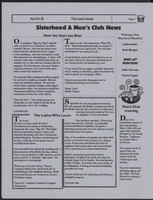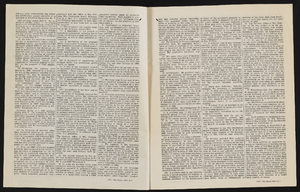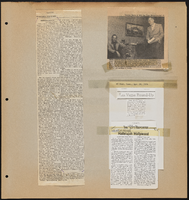Search the Special Collections and Archives Portal
Search Results
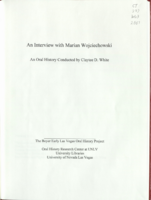
Transcript of interview with Marian Wojciechowski by Claytee White, June 16, 2009
Date
Archival Collection
Description
At age 95, Marian Wojciechowski recalls his personal story of being born a region called called Poland in 1914, just as World War I was beginning. This narrative gives special attention to his Polish background at a time when the country did not technically exist, and their language was forbidden. By the late 1930s and the dawning of World War II, Marian is a young man struggling to understand what is transpiring, but knowing that he must participate in the Polish underground resistance against the Germans His activism gets him arrested and sentenced to Auschwitz as a non-Jew and without penalty of death. He recalls the Gestapo beatings which have left him without feeling in his fingers and a loss of hearing. He shares historical perspectives of the war era, agricultural coops, goal of Germans to sell Jews to the United States and other countries, and a story about a woman who helped save 2500 Jewish children during war.
Text

Interview with William Gus Flangas, November 12, 2004
Date
Archival Collection
Description
Text

Interview with Robert Elmer Friedrichs, June 18, 2004
Date
Archival Collection
Description
Text

Interview with David Alan Buer, August 9, 2006
Date
Archival Collection
Description
Text

Interview with Lawrence Frerric Krenzien, September 8, 2005
Date
Archival Collection
Description
Text
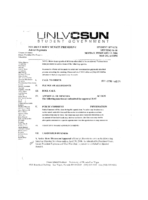
Meeting minutes for Consolidated Student Senate, University of Nevada, Las Vegas, February 13, 2006
Date
Archival Collection
Description
Text

Gregory T. H. Lee oral history interview: transcript
Date
Archival Collection
Description
Oral history interview with Gregory T. H. Lee conducted by Stefani Evans, Ayrton Yamaguchi, Cecilia Winchell, and Kristel Marie Peralta on December 1, 2020 for Reflections: The Las Vegas Asian American and Pacific Islander Oral History Project. Gregory discusses his birth in Honolulu, Hawai'i, his upbringing in San Francisco, California, his education from Harvard University, and his moving to Las Vegas in 1988 with his family. He shares how his parents, Doris Shoong Lee and Ted Lee, purchased a casino on East Sahara Avenue and renamed it the Eureka before Gregory left Las Vegas to earn his Juris Doctorate degree from USC Gould School of Law. He talks about his employment history related to law and the joint venture with his parents to open Eureka's sister property in Mesquite, Nevada. Gregory also discusses his Chinese and Japanese heritage, the Hawaiian culture, and his current affairs as well as his take on current events and discrimination in the United States, with particular regard to Black Lives Matter and COVID-19. Subjects discussed include: Kyushu, Japan and "China virus."
Text

